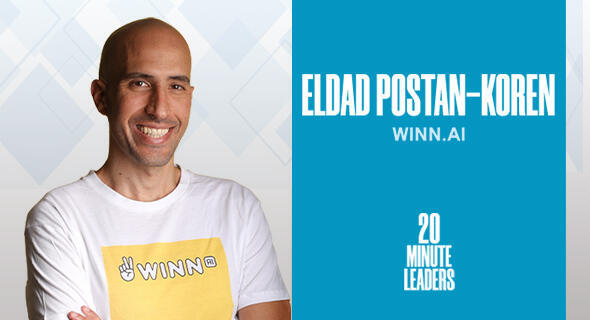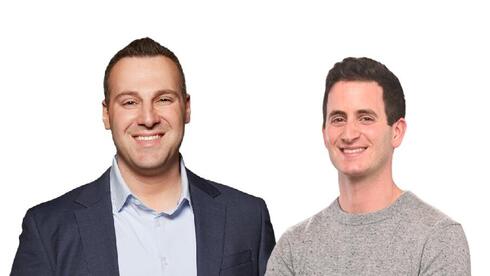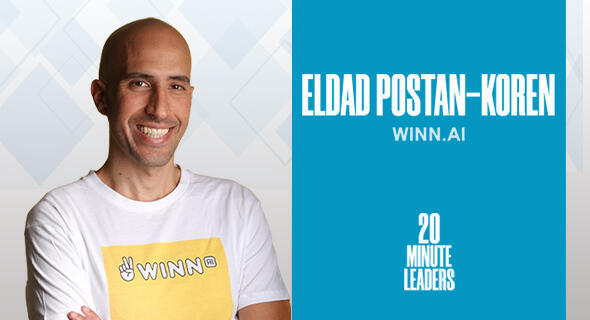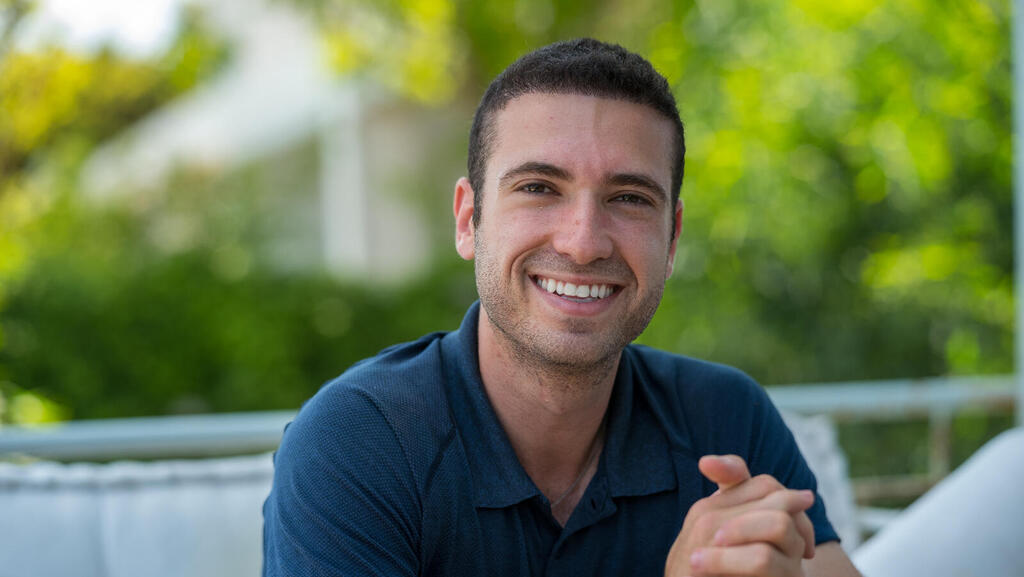
20-Minute Leaders
“Being a salesperson is an amazing toolkit for people in whatever they do.”
Sales should be taught in schools today, says Eldad Postan-Koren, co-founder and CEO of WINN.AI.
Sales should be taught in schools today, says Eldad Postan-Koren, co-founder and CEO of WINN.AI. The skills necessary to be a good salesperson will help people in any job, he explains. In his own sales work, Postan-Koren shares that he was terrible at the manual tasks like updating the CRM, so he built WINN.AI’s product for himself. During video calls, WINN.AI records information from the conversation and uses augmentation to display information that is relevant to the salesperson. He explains that it makes sense to have augmentation to improve your performance on video conferences. Before launching WINN.AI, Postan-Koren co-founded the non-profit Shavot to help girls learn leadership skills and give them more opportunities. He says that his work in startups had been missing the element of making an impact, and he felt a responsibility to take action, which has been a theme in his career.
We are going to talk about the journey of WINN.AI and sales people and AI but also look at your journey with Shavot. Connect the dots for me on your journey.
I think that the major character that goes along in my whole career is taking responsibility. My main motivation is to take responsibility, whether it's about my community, about university when I was in the university.
What do you mean by that?
The way that I take responsibility is when I see something that is wrong or broken or that I can feel that I can do better, I step up and do something about it. I won't wait for someone else to do it for me.
Give me an example. Let's look at Shavot.
In 2018, Roni, my wife—she's a heart surgeon today, back then she was in med school—we felt that we wanted to do something together. After shifting to startups and the high-tech world, I felt that something is missing, like the impact is missing. We started a very interesting conversation while we were hitchhiking together. We asked ourselves, "What is the one thing that you want to change in the world?" We thought about the differences in the chances, the opportunities for men and women in our current world. So we thought about how we can change the world in this aspect. We thought about a program to teach young girls how to be leaders in their community. This was the key moment where Shavot was born. It was hitchhiking for four days from the Mediterranean to the Galilee Sea. We started with 10 girls in Jerusalem five years ago. Today, we have more than 3,000 girls, from the north to the south of Israel, that on a weekly basis, are going through a leadership program with more than 200 instructors.
How do we get somebody who truly does care to take action and take responsibility, the way that you did with Shavot?
The way it works, for me at least, is baby steps. I really believe in small successes. Let's start with just recruiting four students. One step after another. I think that the fact that I'm able to move very fast but have the patience for the long-term, it's a good combination. This is how I manage to achieve small successes, but over time it makes a big difference.
Let's talk about artificial intelligence and sales. What's happening there?
This is the number one profession which is not learned in school. What should be taught in school is how to sell. Being a good salesperson is not only about selling a product or service; it's about the ability to have a message that the other side will receive. To understand that communication is not only about the words, it is also about the emotion and the ability to do public speaking. In Israel, nobody tells you how to be a public speaker from day one. Being a salesperson is an amazing toolkit for people in whatever you want to do: hiring people is doing sales; getting customers is doing sales; fundraising is doing sales.
I think that AI is, once again, a tool. In sales, like 90% of the salespeople don't love to track and don't love to update the CRM after each call. It's tedious and it's boring, and it's tons of manual work. You can use AI for endless scenarios, but I think that there is a really strong use case for solving this very common problem. This is actually the one problem we are trying to solve in WINN.AI, to take the work of note taking, playbook tracking, and updating to the CRM using AI. The other side of the same coin is how to help sales leaders increase the adoption of the playbook.
If we are looking at the vision for WINN.AI a few years down the line, what is the role that AI is playing in sales?
We don't need to wait for Mark Zuckerberg, for Metaverse. I think that today we are communicating through a digital channel, and why shouldn't we use augmented reality based on that digital channel? Now I'm communicating with tons of people through video conference, and it just makes sense. This is how life is going to look. I think it just makes sense to utilize the fact that we are communicating on a digital channel to have augmentation of knowledge, augmentation that captures the knowledge, and augmentation that helps my life to be better and to make me super productive. This is the vision of WINN.AI. WINN.AI is not about sales. WINN.AI is about helping people to remove the manual tasks in their day-to-day. It just makes sense to have this kind of augmentation that helps you to be superhuman.
I encourage anybody listening to just go to the WINN.AI website because it's one of the most fun websites that I've been to.
I felt that it's a little bit too much. But then I was convinced by our director of growth. Today, I love it.
Tell me about the personas within organizations that you consider as the early adopters.
Today I can split the audience into three. You have the sales development people. Today, we do not support dialers, but we do support video conferences. Some of the VTRs, SDRs, or XDRs use Zoom for qualification and the top of the funnel conversation. The second persona is the AE, the account executive, the salesperson—usually, in a software company. But the third persona is the AE who doesn't sell software. This is a huge opportunity that we see, and we target them as well.
What are the main milestones that you foresee for WINN.AI in the near future as you are growing this?
First, I want to support all of the video conferences. I want to support all of the dialers. I will be able to support SDRs who use dialers from one end to customer success and support on the other end. By the way, when we will be able to do that, we will also solve a very big problem in organization in management of the data in the handoffs.
The other end is to keep improving the AI ability of tracking and capturing and truly understanding the conversation. If I ask you, "How many employees are you?" and your answer is "20" or "20 employees," or if I ask you, "Are you 20 employees?" and your answer is "Yes," these are three ways to ask the same question, and a machine won't necessarily understand the same answer. Understanding of the context is, like, 90% of human conversation. We see now the beginning of success in this effort as well.
Tell me about why you founded WINN.AI.
From my personal experience as a salesperson, I sucked at filling out the CRM. So first, I build the product for myself. But second, the opportunity to do something huge, scalable, global. That's my major motivation and inspiration in what we do.
Who is the type of person that you want to partner with on this journey?
Winners at heart. Because winners are people who love to win and don't see losing as an opportunity. They understand that they may lose in one bottle but they need to win the war. People who have perseverance and have real hunger to get out of their comfort zone. You need to be a team player. This is not a marathon that you are running alone. It's all about the ability to connect and communicate very transparently, very easily with other people.
Michael Matias, Forbes 30 Under 30, is a Venture Fellow at Innovation Endeavors as well as investment Venture Partner at Secret Chord and J-Ventures. He studies Artificial Intelligence and Human-Computer Interaction at Stanford University, and was an engineer at Hippo Insurance. Matias previously served as an officer in the 8200 unit. 20MinuteLeaders is a tech entrepreneurship interview series featuring one-on-one interviews with fascinating founders, innovators and thought leaders sharing their journeys and experiences.
Contributing editors: Michael Matias, Megan Ryan















